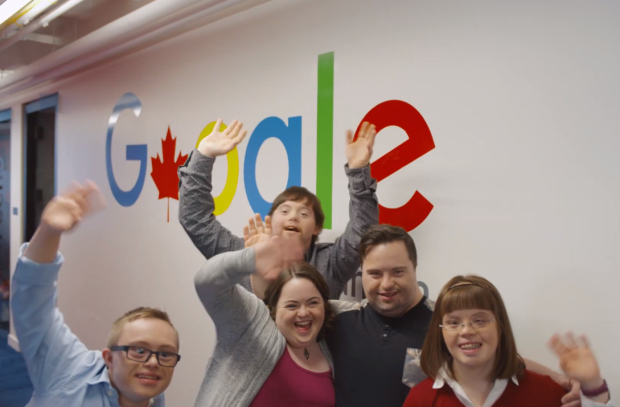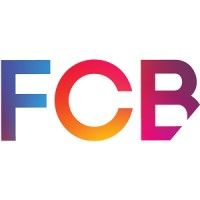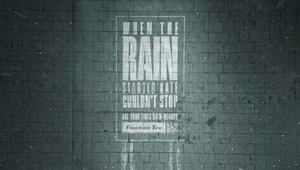
“Millions of People Living with Down Syndrome Were Going to Be Left Out of the Voice-First Revolution”

FCB Canada has been working closely with the Canadian Down Syndrome Society for the past five years. The chair of the Canadian Down Syndrome Society, Ed Casagrande, had worked with a managing director from the IPG network - which FCB is a part of - before and wanted to create a campaign for the organisation. Ed's daughter had been born with Down syndrome and he wanted to give the community a greater voice.
At the time, the Canadian Down Syndrome Society was well known within its local community for providing information, advocacy and education for people living with the condition but had little to no awareness outside of that. Over the course of FCB’s relationship with the organisation it has grown to become a champion for the community globally. “It’s because the work we create looks to change, advocate or shift perceptions around specific moments along the Down syndrome journey,” says Nancy Crimi-Lamanna, chief creative officer at FCB Canada. “And those moments are universal.”
The latest project to launch from the partnership, 'Project Understood', aims to teach Google's AI voice technology how to understand people with Down syndrome. According to Google, the technology has an error rate on average of one in every three words spoken by someone with Down syndrome - this is because the tech has not been designed to accommodate their unique speech patterns, which are due to different facial skeletal and muscular systems. Considering that there will be 8 billion voice assistants in the world by 2023 - according to research by FCB - these consistent errors will be counterproductive to voice technology’s purpose of providing ease and freedom in daily life. “The millions of people living with Down syndrome were going to be left out of the voice-first revolution,” says Nancy. “Google’s voice assistant currently misunderstands about one in every three words they speak, making it virtually unusable for a community that has a lot to gain from it.”
Rather than starting the project with a brief, FCB started with what Nancy calls a “crazy ambition”. How could they get voice technology to understand people with Down syndrome? “Instead of going into creative ideation, we started a research phase talking to tech companies and platforms that were trying to solve the same issue,” Nancy tells me. “The breakthrough came when we reached out to Google. They were immediately open and receptive to talking to us as they recognise the problem and wanted to solve the issue as well. Our mission was further championed by our global FCB chief innovation officer Kris Hoet who put us in touch with an advocate at Google; who lives with non-standard speech herself.”
For the initial trial, FCB reached out to the Down syndrome community in Canada to recruit nine adults living with Down syndrome. Once they were identified, Google provided each participant with a web link to ChitChat, a voice recording platform, where they were asked to record 1700 words and phrases which represented a variety of vocal sounds and patterns.
Some examples of phrases are:
- He said buttercup, buttercup, buttercup, buttercup all day
- I owe you a yo-yo today
- Buy Bobby a puppy
- Bamboo walls are getting to be very popular because they are strong, easy to use, and good-looking.
- Strawberry jam is sweet.
- She looked in her mirror.
The more data the project can harvest, the more accurate the algorithm can become. ‘Project Understood’ needed and needs to be constantly nurtured with information on top of this trial phase so a core component of the campaign is to recruit enough people and collect enough voice data from people with Down syndrome to improve Google’s speech recognition model. Each sample will contribute to a database to teach Google's voice technology. “The hope is that there are enough correlations in voice patterns for other groups with speech impairments to benefit from these voice recordings as well,” says Nancy. “This is a faster and more scalable model compared to having to recreate this learning with other groups of people with speech impairments. In this way, people with Down syndrome are taking the lead on helping to ensure a more accessible future for all people with atypical speech.”
The next step for Nancy and FCB is to target other tech giants and their voice assistants - namely Siri and Alexa - to start similar projects. Nancy adds: “We also imagine a world where the data is open to be shared so that they can work together to ensure a more accessible future for everyone.”
Looking to the relationship between FCB and the Canadian Down Syndrome Society more broadly, Nancy believes its success globally at advertising award shows and more generally in culture is down to their trend-bucking approach to the creative. She sees a lot of work being done around disabilities focusing on shifting perceptions around ability - something that can be very generic, making it harder to stand out. “We’ve chosen to affect change and shift perceptions at specific moments and on very specific issues facing the Down syndrome community,” she says. “From the moment of diagnosis with ‘Down Syndrome Answers’, to the moment of birth with ‘Anything But Sorry’ to adulthood and the challenges they face in education, employment and housing with ‘Endangered Syndrome’.
“Telling these very specific human stories makes it far more powerful emotionally,” adds Nancy. “We also take care to portray the community in ways people haven’t seen before: from charming experts to swearing self-advocates to angry activists and finally, this year as dedicated teachers. Interestingly enough, while we didn’t set out to help people see the ability in the community, it’s been a by-product of every campaign.”
Another by-product of each campaign has been the abundance of earned media. Nancy estimates that they’ve not spent more than $150,000 in production and media over the last four years, and yet they’ve achieved over 3 billion earned media impressions and donations have increased 429% - and none of those numbers include this year’s campaign. But, more importantly for Nancy, they are having a real impact in the world. Every one of the 40 videos that they created for ‘Down Syndrome Answers’ has achieved top 10 in Google rankings with most at number one, which means the content will always be available for parents in need of answers without any paid media dollars. And this year, the UN went on record on World Down Syndrome Day to ensure no new parent ever heard sorry again. “In fact, the results have been so remarkable that the Canadian Down syndrome society has become the leading voice for people with Down syndrome worldwide,” she says. “This case is a real testament to what we do every day when we’re at our best; use creativity as an economic multiplier for brands.”
One curse of success like this is obviously a fear of failure - something that Nancy is open about when I ask her of the challenges when it comes to keeping the work fresh and purposeful each year. “I think the major challenge we face every year is overcoming the fear and anxiety that we don’t have anything left to give; that somehow we’re going to blow it this year,” she says. “So, we don’t look to beat last year’s campaign, but only to do something completely different. The death of creativity is to be iterative. What we do keep consistent though is a platform that makes people living with Down syndrome central to our stories and active in the solution.”
The team also do a ton of research both in reading thought leadership pieces around what’s happening globally as well as having conversations with their clients and community to unearth a new insight, issue or moment they can help through creativity. They’ve even had families within the community visit the agency and talk to the creative department, so they can connect first-hand with the issues they face. “When you start with a solid foundation, typically amazing things grow out of it,” says Nancy.
To add to this, FCB and the Canadian Down Syndrome Society also work in a particularly collaboratively way. Nancy sees it less of a client/agency relationship and more like FCB acting as if they’re on the board of directors. “That means lots of conversations around the work and the plan to get it into the world. We’ve developed a deep level of respect and trust over the last four years which is key when you’re doing work that pushes boundaries and challenges the status quo.”
FCB’s work with the Canadian Down Syndrome Society is something that Nancy is proud of and passionate about. She tells me that the community is “incredibly loving, inclusive and generous”. They’ve become family and the team at FCB Canada is emotionally invested in their success as they are. A point of proof is that the ‘Anything But Sorry’ campaign was actually shot in Nancy’s house. Some of the parents felt compelled to thank her by bringing house gifts.
“One of my fondest memories over the last four years,” ponders Nancy, “was the moment a young couple used our ‘Anything but Sorry’ video to announce they were expecting a child with Down syndrome to their family and friends. The responses back were joyful and welcoming. Seeing the work tangibly change behaviour and make a difference means more to us than all the awards put together.
“I think that’s why I’m most proud of the work we’re doing this year. Project Understood has the capacity to create a more independent future for those living with Down syndrome, impacting change on a number of fronts from education to housing and employment. Beyond the Down syndrome community, it will also make voice technology better for other people living with atypical speech too. The far-reaching implications of this project will mean accessibility to the benefits of voice technology for all.”













